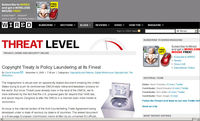
At issue is the internet section of the Anti-Counterfeiting Trade Agreement being developed under a cloak of secrecy by dozens of countries. The leaked document is a three-page European Commission memo written by an unnamed EU official, which purports to summarizes a private briefing given in September by U.S. trade officials.
The language in the Sept. 30 memo shows the United States wants ISPs around the world to punish suspected, repeat downloaders with a system of “graduated response” — code for a three-strikes policy that results in the customer eventually being disconnected from the internet with the ISP alone deciding what constitutes infringement and fair use.
While the proposal specifically says that three strikes wouldn’t be mandated, it might as well be. That’s because companies that refused to implement the policy would be ejected from the immunity or “safe harbor” that otherwise protects them from copyright infringement lawsuits over the actions of their customers.
Obama hasn’t asked Congress to implement a three-strike policy, which could anger consumers and watchdog groups. But if the administration gets three strikes written into ACTA, and the United States signs and ratifies the treaty, Congress would be obliged to change the DMCA to comply with it, while the administration throws its hands in the air and says, “It wasn’t our idea! It’s that damn treaty!”
That practice is common enough to have a name: policy laundering.
http://www.wired.com/threatlevel/2009/11/policy-laundering/

